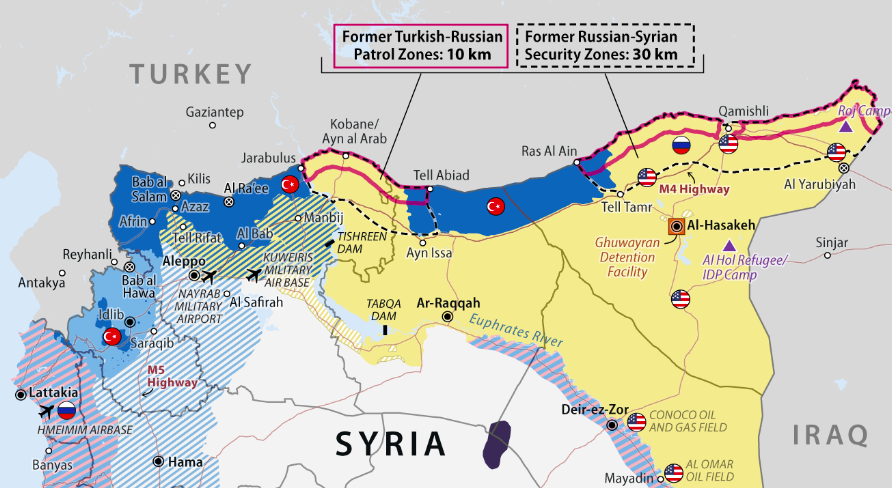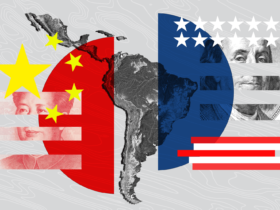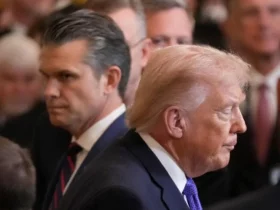Future order of Syria and beyond.
Future order of Syria and beyond.
Recently, the Pentagon has announced that US military presence in Syria was not consisting of 900 soldiers, as they have repeatedly declared, but of 2000 soldiers.
These forces are stationed in the East of the Euphrates, together and actually safeguarding, forces of the PKK and the Syrian Democratic Forces.
We spoke with Dr. Fahri Erenel, retired general of the Turkish Armed Forces, about the strategic goals underlying this military presence.
What is the strategic importance of the American bases east of the Euphrates? What are their strategic goals?
The U.S. strategic bases east of the Euphrates should be evaluated in conjunction with America’s overall Middle East policy. Yes, although they said that they continue presence here to fight Daesh, the presence of Daesh on the ground, the attacks carried out by Daesh here or others are at a level that does not require the US to have such a comprehensive force or force here. In other words, they can be neutralized by air operations or missiles over bases in different countries.
Therefore, it should be taken into account that the United States is primarily on the east of the Euphrates with the aim of preventing Iran’s westward opening through Hezbollah and Syria and to limit Iran. Of course, this should also be considered as a whole in Iraq. In other words, it is necessary to consider the American bases in Iraq and the bases in Syria towards the Euphrates.
We can think that the US is trying to create a serious obstacle especially against the transport of Iranian oil and natural gas resources to the Mediterranean.
Secondly, of course, they are extremely important for Israel’s security. Beyond the moves that Israel has made beyond the Golan Heights, I actually equate Israel’s supply with the Greater Middle East project in this region with their idea of “promised lands”. It follows that same logic, although the goals are the religious, ideological or political. How will Israel’s security be ensured? That’s why to the West of the Golan Heights, there is consideration of a Druze state. In fact, the Druze state existed in the year 1929, along with a state of Damascus, Aleppo and a Nusayri state.
In that context, the US base in Al Tanf is crucial to establish the so-called David Corridor between the areas east of the Euphrates, controlled by the PKK-PYD, and the Golan Heights.
Thirdly, in connection with those former states, claims for regional autonomy. There’s much talk about territorial integrity, but remember, the US itself has territorial integrity. Notwithstanding that, it consists of federal states. Similarly, France and Spain have federal entities or cantons.
I expect that Syria will become similar to Iraq, consisting of autonomous regions. Because Joe Biden, then Vice-president, has established in 2005 such a constitution for Iraq.
Such a constitution has several problems, obviously. It weakens the central government seriously. For that purpose, the US has at the same time established bases and invested heavily into the PKK, turning it into a garrison state.
What is in your perspective the US plan for the future of Syria?
I think they consider a Syria consisting of 4 or 5 parts. One is an Alawite entity, located on the coast. This includes the Russian military bases.
A second region is in the East of the Euphrates, an entity established by the PKK. This will of course not be an independent state, but an entity connected to the Syrian state.
A third region might be established around the province of Idlib, governed mostly by Islamic principles.
And a fourth region would consist of areas with Sunni domination, such as Aleppo, Hama, Homs and Damascus, as a special region.
In the long term, the US will try to connect the Kurdish region in Syria with that in Iraq. Two of the world’s biggest embassies are located in Arbil, capital of the Kurdish autonomous region in Iraq: The Chinese and the US. The US will never give up on that.
And how do you see the Turkish position here?
For Türkiye, this is an existential threat. Should such a regional entity be established in Syria, all previous military interventions would have been in vain.
True that Türkiye holds the area west of the Euphrates, but in my opinion, it needs to push the PKK further south. Special attention needs the area around Ayn al Arab. Previously, Russian military was stationed here, but they have left. Now, the area is entirely controlled by the PKK.
According to the agreement of 2019, the Russians were supposed to clear the area of PKK elements, with Ankara staying out. Now that they have left, Türkiye does not have to abide but that agreement and clear they are out.
Main graphic by US Congressional Research Service, CRS.

















Leave a Reply